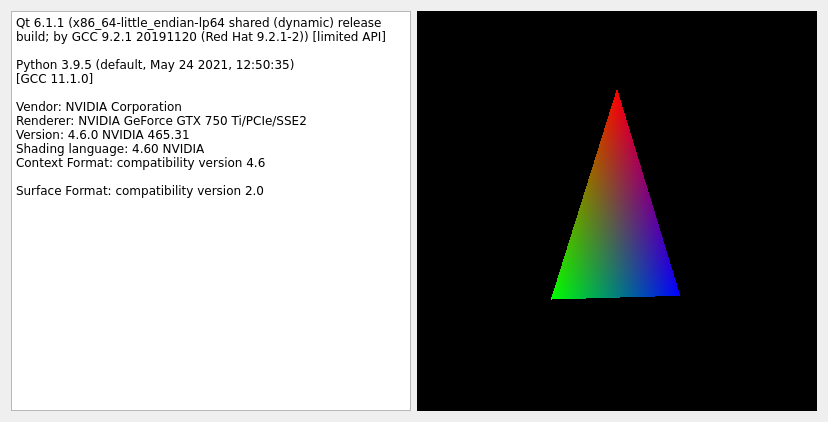Context Info Example¶
The example shows the information about the OpenGL-related graphics configuration of the current system. This can be useful as a diagnostic tool.

"""PySide6 port of the opengl/contextinfo example from Qt v5.x"""
from argparse import ArgumentParser, RawTextHelpFormatter
import numpy
import sys
from textwrap import dedent
from PySide6.QtCore import QCoreApplication, QLibraryInfo, QSize, QTimer, Qt
from PySide6.QtGui import (QMatrix4x4, QOpenGLContext, QSurfaceFormat, QWindow)
from PySide6.QtOpenGL import (QOpenGLBuffer, QOpenGLShader,
QOpenGLShaderProgram, QOpenGLVertexArrayObject)
from PySide6.QtWidgets import (QApplication, QHBoxLayout, QMessageBox, QPlainTextEdit,
QWidget)
from PySide6.support import VoidPtr
try:
from OpenGL import GL
except ImportError:
app = QApplication(sys.argv)
message_box = QMessageBox(QMessageBox.Critical, "ContextInfo",
"PyOpenGL must be installed to run this example.",
QMessageBox.Close)
message_box.setDetailedText("Run:\npip install PyOpenGL PyOpenGL_accelerate")
message_box.exec()
sys.exit(1)
vertex_shader_source_110 = dedent("""
// version 110
attribute highp vec4 posAttr;
attribute lowp vec4 colAttr;
varying lowp vec4 col;
uniform highp mat4 matrix;
void main() {
col = colAttr;
gl_Position = matrix * posAttr;
}
""")
fragment_shader_source_110 = dedent("""
// version 110
varying lowp vec4 col;
void main() {
gl_FragColor = col;
}
""")
vertex_shader_source = dedent("""
// version 150
in vec4 posAttr;
in vec4 colAttr;
out vec4 col;
uniform mat4 matrix;
void main() {
col = colAttr;
gl_Position = matrix * posAttr;
}
""")
fragment_shader_source = dedent("""
// version 150
in vec4 col;
out vec4 fragColor;
void main() {
fragColor = col;
}
""")
vertices = numpy.array([0, 0.707, -0.5, -0.5, 0.5, -0.5], dtype=numpy.float32)
colors = numpy.array([1, 0, 0, 0, 1, 0, 0, 0, 1], dtype=numpy.float32)
def print_surface_format(surface_format):
profile_name = 'core' if surface_format.profile() == QSurfaceFormat.CoreProfile else 'compatibility'
major = surface_format.majorVersion()
minor = surface_format.minorVersion()
return f"{profile_name} version {major}.{minor}"
class RenderWindow(QWindow):
def __init__(self, fmt):
super().__init__()
self.setSurfaceType(QWindow.OpenGLSurface)
self.setFormat(fmt)
self.context = QOpenGLContext(self)
self.context.setFormat(self.requestedFormat())
if not self.context.create():
raise Exception("Unable to create GL context")
self.program = None
self.timer = None
self.angle = 0
def init_gl(self):
self.program = QOpenGLShaderProgram(self)
self.vao = QOpenGLVertexArrayObject()
self.vbo = QOpenGLBuffer()
fmt = self.context.format()
use_new_style_shader = fmt.profile() == QSurfaceFormat.CoreProfile
# Try to handle 3.0 & 3.1 that do not have the core/compatibility profile
# concept 3.2+ has. This may still fail since version 150 (3.2) is
# specified in the sources but it's worth a try.
if (fmt.renderableType() == QSurfaceFormat.OpenGL and fmt.majorVersion() == 3
and fmt.minorVersion() <= 1):
use_new_style_shader = not fmt.testOption(QSurfaceFormat.DeprecatedFunctions)
vertex_shader = vertex_shader_source if use_new_style_shader else vertex_shader_source_110
fragment_shader = fragment_shader_source if use_new_style_shader else fragment_shader_source_110
if not self.program.addShaderFromSourceCode(QOpenGLShader.Vertex, vertex_shader):
log = self.program.log()
raise Exception("Vertex shader could not be added: {log} ({vertexShader})")
if not self.program.addShaderFromSourceCode(QOpenGLShader.Fragment, fragment_shader):
log = self.program.log()
raise Exception(f"Fragment shader could not be added: {log} ({fragment_shader})")
if not self.program.link():
log = self.program.log()
raise Exception(f"Could not link shaders: {log}")
self._pos_attr = self.program.attributeLocation("posAttr")
self._col_attr = self.program.attributeLocation("colAttr")
self._matrix_uniform = self.program.uniformLocation("matrix")
self.vbo.create()
self.vbo.bind()
self._vertices_data = vertices.tobytes()
self._colors_data = colors.tobytes()
vertices_size = 4 * vertices.size
colors_size = 4 * colors.size
self.vbo.allocate(VoidPtr(self._vertices_data), vertices_size + colors_size)
self.vbo.write(vertices_size, VoidPtr(self._colors_data), colors_size)
self.vbo.release()
vao_binder = QOpenGLVertexArrayObject.Binder(self.vao)
if self.vao.isCreated(): # have VAO support, use it
self.setup_vertex_attribs()
def setup_vertex_attribs(self):
self.vbo.bind()
self.program.setAttributeBuffer(self._pos_attr, GL.GL_FLOAT, 0, 2)
self.program.setAttributeBuffer(self._col_attr, GL.GL_FLOAT, 4 * vertices.size, 3)
self.program.enableAttributeArray(self._pos_attr)
self.program.enableAttributeArray(self._col_attr)
self.vbo.release()
def exposeEvent(self, event):
if self.isExposed():
self.render()
if self.timer is None:
self.timer = QTimer(self)
self.timer.timeout.connect(self.slot_timer)
if not self.timer.isActive():
self.timer.start(10)
else:
if self.timer and self.timer.isActive():
self.timer.stop()
def render(self):
if not self.context.makeCurrent(self):
raise Exception("makeCurrent() failed")
functions = self.context.functions()
if self.program is None:
functions.glEnable(GL.GL_DEPTH_TEST)
functions.glClearColor(0, 0, 0, 1)
self.init_gl()
retina_scale = self.devicePixelRatio()
functions.glViewport(0, 0, self.width() * retina_scale,
self.height() * retina_scale)
functions.glClear(GL.GL_COLOR_BUFFER_BIT | GL.GL_DEPTH_BUFFER_BIT)
self.program.bind()
matrix = QMatrix4x4()
matrix.perspective(60, 4 / 3, 0.1, 100)
matrix.translate(0, 0, -2)
matrix.rotate(self.angle, 0, 1, 0)
self.program.setUniformValue(self._matrix_uniform, matrix)
if self.vao.isCreated():
self.vao.bind()
else: # no VAO support, set the vertex attribute arrays now
self.setup_vertex_attribs()
functions.glDrawArrays(GL.GL_TRIANGLES, 0, 3)
self.vao.release()
self.program.release()
# swapInterval is 1 by default which means that swapBuffers() will (hopefully) block
# and wait for vsync.
self.context.swapBuffers(self)
self.context.doneCurrent()
def slot_timer(self):
self.render()
self.angle += 1
def glInfo(self):
if not self.context.makeCurrent(self):
raise Exception("makeCurrent() failed")
functions = self.context.functions()
gl_vendor = functions.glGetString(GL.GL_VENDOR)
gl_renderer = functions.glGetString(GL.GL_RENDERER)
gl_version = functions.glGetString(GL.GL_VERSION)
gl_lang_version = functions.glGetString(GL.GL_SHADING_LANGUAGE_VERSION)
context_surface_format = print_surface_format(self.context.format())
surface_format = print_surface_format(self.format())
text = (f"Vendor: {gl_vendor}\n"
f"Renderer: {gl_renderer}\n"
f"Version: {gl_version}\n"
f"Shading language: {gl_lang_version}\n"
f"Context Format: {context_surface_format}\n\n"
f"Surface Format: {surface_format}")
self.context.doneCurrent()
return text
class MainWindow(QWidget):
def __init__(self):
super().__init__()
h_box_layout = QHBoxLayout(self)
self._plain_text_edit = QPlainTextEdit()
self._plain_text_edit.setMinimumWidth(400)
self._plain_text_edit.setReadOnly(True)
h_box_layout.addWidget(self._plain_text_edit)
self._render_window = RenderWindow(QSurfaceFormat())
container = QWidget.createWindowContainer(self._render_window)
container.setMinimumSize(QSize(400, 400))
h_box_layout.addWidget(container)
def update_description(self):
build = QLibraryInfo.build()
gl = self._render_window.glInfo()
text = f"{build}\n\nPython {sys.version}\n\n{gl}"
self._plain_text_edit.setPlainText(text)
if __name__ == '__main__':
parser = ArgumentParser(description="contextinfo", formatter_class=RawTextHelpFormatter)
parser.add_argument('--gles', '-g', action='store_true',
help='Use OpenGL ES')
parser.add_argument('--software', '-s', action='store_true',
help='Use Software OpenGL')
parser.add_argument('--desktop', '-d', action='store_true',
help='Use Desktop OpenGL')
options = parser.parse_args()
if options.gles:
QCoreApplication.setAttribute(Qt.AA_UseOpenGLES)
elif options.software:
QCoreApplication.setAttribute(Qt.AA_UseSoftwareOpenGL)
elif options.desktop:
QCoreApplication.setAttribute(Qt.AA_UseDesktopOpenGL)
app = QApplication(sys.argv)
main_window = MainWindow()
main_window.show()
main_window.update_description()
sys.exit(app.exec())
© 2022 The Qt Company Ltd. Documentation contributions included herein are the copyrights of their respective owners. The documentation provided herein is licensed under the terms of the GNU Free Documentation License version 1.3 as published by the Free Software Foundation. Qt and respective logos are trademarks of The Qt Company Ltd. in Finland and/or other countries worldwide. All other trademarks are property of their respective owners.
